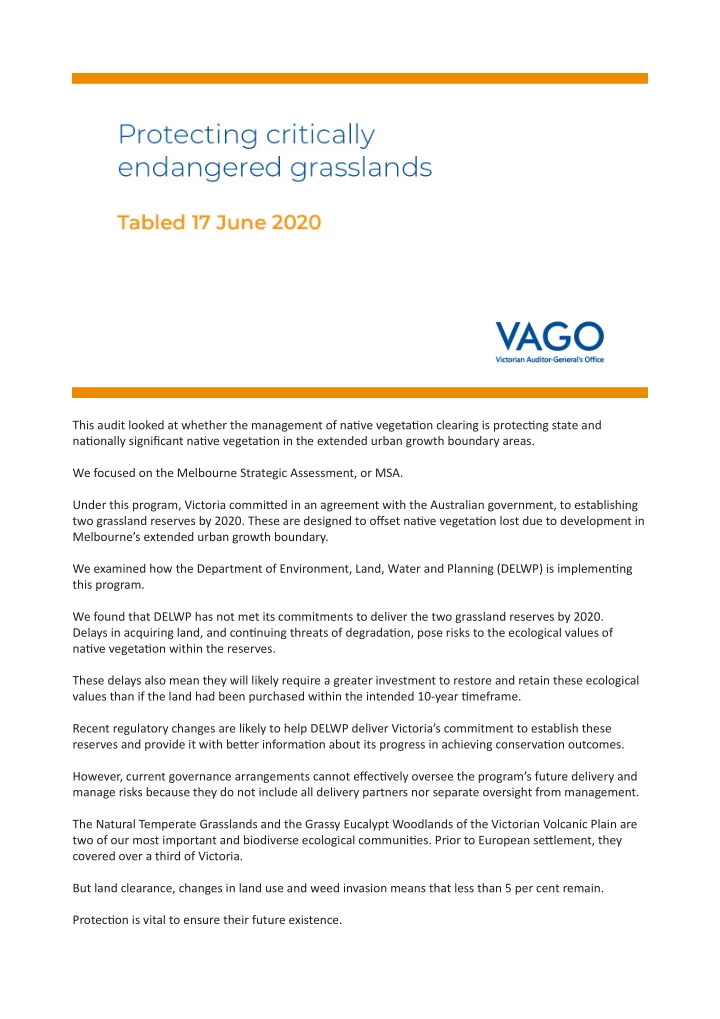

This audit looked at whether the management of natjve vegetatjon clearing is protectjng state and natjonally signifjcant natjve vegetatjon in the extended urban growth boundary areas. We focused on the Melbourne Strategic Assessment, or MSA. Under this program, Victoria commitued in an agreement with the Australian government, to establishing two grassland reserves by 2020. These are designed to ofgset natjve vegetatjon lost due to development in Melbourne’s extended urban growth boundary. We examined how the Department of Environment, Land, Water and Planning (DELWP) is implementjng this program. We found that DELWP has not met its commitments to deliver the two grassland reserves by 2020. Delays in acquiring land, and contjnuing threats of degradatjon, pose risks to the ecological values of natjve vegetatjon within the reserves. These delays also mean they will likely require a greater investment to restore and retain these ecological values than if the land had been purchased within the intended 10-year tjmeframe. Recent regulatory changes are likely to help DELWP deliver Victoria’s commitment to establish these reserves and provide it with betuer informatjon about its progress in achieving conservatjon outcomes. However, current governance arrangements cannot efgectjvely oversee the program’s future delivery and manage risks because they do not include all delivery partners nor separate oversight from management. The Natural Temperate Grasslands and the Grassy Eucalypt Woodlands of the Victorian Volcanic Plain are two of our most important and biodiverse ecological communitjes. Prior to European setulement, they covered over a third of Victoria. But land clearance, changes in land use and weed invasion means that less than 5 per cent remain. Protectjon is vital to ensure their future existence.
To help address this, Victoria and the Australian Government streamlined environmental approvals and commitued to the MSA program’s grassland reserves. To purchase land for the reserves, DELWP collects fees from developers. DELWP aimed to achieve full cost recovery of the MSA program by 2062. To date, only 10 per cent of designated land has been acquired for the Western Grassland Reserve. No land has been acquired for the Grassy Eucalypt Woodland Reserve. DELWP is keeping pace with development, protectjng two hectares in the reserve for every one cleared. However, it can’t demonstrate that the quality of land purchased matches that of land cleared. Most of the land acquired will need intensive management. Delays in acquiring land have been compounded by cost increases. Estjmated program costs have increased around 80 per cent between 2013 to 2019, mostly due to rising land values. However, DELWP has not raised habitat compensatjon fees since 2013, limitjng available funds. Managing land designated for a reserve but stjll privately held is a challenge for DELWP, partjcularly as weed infestatjon can degrade ecological values. DELPW can’t access this land to do assessments or weed management without owner consent. Although DELWP has implemented weed control programs, take-up has been low. DELWP was slow to put MSA governance arrangements in place and changed them several tjmes. This has limited their efgectjveness, meaning DELWP has missed key oversight actjvitjes or not always performed them consistently or to expected standards.
DELWP’s monitoring of program outcomes is done with scientjfjc rigour. It has clear key performance indicators with measurable benchmarks. However, its output performance indicators do not have targets to generate meaningful data. The slow acquisitjon of land has also constrained DELWP’s ability to assess and monitor land within the reserves. Together, these issues mean that the costs to acquire all land designated for the reserves and restore and retain that land’s ecological values will likely be far greater than initjally expected. Recent changes to the MSA’s regulatory framework, including increases in the fees developers pay, aim to address the program’s cost recovery. Current developer fees will be replaced with an environment mitjgatjon levy and implementatjon controls introduced to ensure comprehensive independent monitoring. This will strengthen program accountability and transparency while making it more likely that DELWP will be able to deliver the grassland reserves as ofgsets. We made 7 recommendatjons to DELWP: • 2 on managing privately held land • 2 on establishing the reserves and collectjng data on the conditjon of private land earmarked for the reserves, and • 3 on oversight, performance reportjng and communicatjons. For further informatjon please view the full report on our website.
Recommend
More recommend